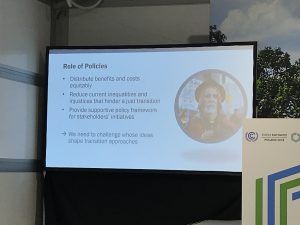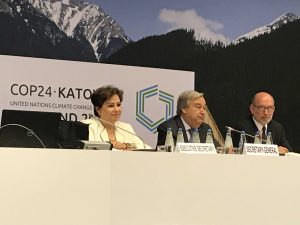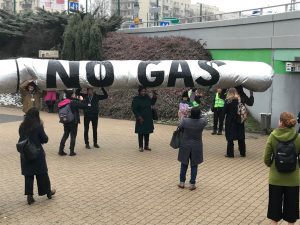One of the main focus areas that the Polish Presidency selected for COP24 is “Human.” As I stated in my first blog post, Michal Kurtyka defines this theme as the need to lead change together with people through solidarity and fair transformation of regions and industrial sectors. He places emphasis on a low carbon transition that will help to protect the climate while maintaining economic development and jobs through modernization, technological change, and the innovations for efficient resource use. Therefore, throughout the COP, there have been multiple sessions on “Just Transition”.
The term “Just Transition” actually comes from the environmental justice community and labor unions, which consisted mostly of low-income communities of color. The environmental movement has largely left out the issues of injustice, which prompted the environmental justice movement by indigenous peoples, communities of color, labor unions, and low-income communities. “Just Transition” encompasses “a host of strategies to transition whole communities to build thriving economies that provide dignified, productive and ecologically sustainable livelihoods; democratic governance and ecological resilience.[1]”
I attended a session titled, “From local approaches to (inter)national policy: Gender Just Transition and Decent Work,” which spoke about the need for Just Transition to promote rapid decarbonization, challenge social inequalities, and overcome a green growth agenda. The session was led by gender equity and human rights NGOs as well as members of the local and indigenous communities. The purpose of the event was to question the predominant idea of work, power relations, consider intersectional issues (gender, human rights), and the participation of indigenous/local communities in climate action. Participants and presenters alike deemed that the COP has co-opted the term and the concept of Just Transition because the COP has narrowly presented Just Transition as the loss of coal mining jobs due to the transition to a low-carbon economy. However, Just Transition, as pointed out by a representative of the International Labor Organization, encompasses more than fossil fuel extraction. It includes non-discrimination, gender equity, and new jobs created in agriculture, transportation, etc. The presenters questioned who benefits from not transitioning and/or transitioning to a low carbon economy, what are the intersections of communities from whom a low carbon economy is both economically critical yet socially damaging, and how to reclaim the concept of Just Transition.

Just Transition side-event
It has been quite clear that the term “Just Transition” has been used as a concept to undermine the efforts of the Paris Agreement and justify scaling-back ambition to reach the temperature goal. The focus on only those who lose jobs as a result of decarbonization is very narrow and runs against the current of the purpose of acting on climate change. As has been proven, anthropogenic fossil fuel emissions are altering the climate system and we have to take action, against our current economic structures, to scale back on fossil fuel use. Valuing the jobs of those who work in the fossil fuel industry against those who are literally losing their homes, cultures, civilizations is problematic especially because the latter group has been protecting the Earth and/or are from low-income countries that have not contributed to global climate change.
The UN Secretary-General, António Guterres, stated today that he does not accept the argument that negative social impacts of climate action are a reason not to act. Considering the social dimension is critical, which is why social policies to address these consequences must happen concurrently with climate policy. He will not allow “Just Transition” to be used as a weapon to block climate action that is critically needed to save the Earth, its ecosystems, and its people.

UN Secretary-General, António Guterres, addressing observer organizations
[1] https://climatejusticealliance.org/just-transition/



